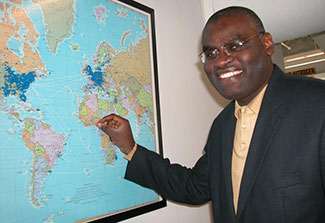Examining the bioethics landscape in Nigeria today, it’s difficult to imagine how recently it was a barren plain. Nigerian scientist Dr. Clement Adebamowo recalls a “perfect storm” of events that spurred him to develop a bioethics research training program at the University of Ibadan.
In 1996, a controversial drug trial conducted during a meningitis outbreak caused fatalities, triggering a backlash against researchers. Meanwhile, global outsourcing of clinical trials was growing in popularity, taking advantage of low-cost settings with little or no regulation. Finally, the “Out of Africa” theory of evolution was generating interest among researchers keen to conduct population studies that might determine the genetic basis of diseases.

Photo courtesy of Dr. Clement Adebamowo
Adebamowo began his bioethics training program with a Fogarty planning grant through the
International Research Ethics Education and Curriculum Development Award program in 2004. He and his team developed web resources, conducted sensitivity and public awareness campaigns, and offered training to institutions to strengthen their research ethics committees. Once he received a full grant, he launched a master’s degree program designed to serve as a bioethics resource for all of West Africa. The first class of master’s students was drawn from nursing, biomedical research and public health. Coursework included classes on informed consent, research design, philosophy of bioethics, religion and ethics, and qualitative and quantitative research methods.
Eight of his faculty obtained master’s degrees in bioethics through established Fogarty training programs in the U.S. and Canada. They in turn have provided instruction at Ibadan, mentoring 20 students through the master’s program and more than 1,000 West African researchers through a short course. The “multiplier effect” is huge, Adebamowo observed. “For us in Nigeria, the Fogarty funding for bioethics changed the entire landscape. What we have now would have been impossible without the Fogarty funding,” he said.
In concert with his training efforts, Adebamowo also helped the health ministry transform Nigeria’s national ethics system and drafted the country’s first formal code for research ethics. His trainees held or assumed positions in state and federal institutions, creating a framework and resource as the code was implemented. His NIH funding provided credibility, he said, which was helpful as he re-established and chaired the national ethics committee, created a web-based research protocol tracking system, and initiated or strengthened 25 Institutional Review Boards across the country.
The cultural shift has been enormous and will have lasting impact, he said. “The most significant thing we’ve achieved is elevating the status of research ethics and helping researchers and Nigerians in general appreciate the value of ethical conduct of research,” said Adebamowo. “We have more people who know that there is a way of doing research that is both scientifically appropriate and ethically sound. Those people will pass this down to their trainees, so over time a better research culture will develop.”
More Information